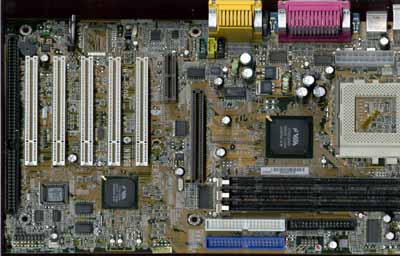VIA Apollo Pro 133A Motherboard Roundup - July 2000
by Anand Lal Shimpi on July 21, 2000 5:31 AM EST- Posted in
- Motherboards
Microstar MS-6309
|
Microstar MS-6309 Specifications |
|
| CPU Interface |
Socket-370
|
| Chipset |
VIA
Apollo 133A
VIA 694X North Bridge VIA 686A South Bridge |
| L2 Cache |
N/A
(on-chip)
|
| Form Factor |
ATX
|
| Bus Speeds |
66
/ 79 / 85 / 87.5 / 90 / 92.5 / 95
100 / 110 / 115 / 120 / 124 / 129 / 133 / 138 143 / 147 / 152 / 154 / 157 / 159 / 171 / 180 / 190 / 200 |
| Voltages Supported |
Auto
Detect
Increase by 0.05 - 0.25V (in 0.05V steps) |
| Memory Slots |
3
168-pin DIMM Slots
|
| Expansion Slots |
1
AMR Slot
1 AGP Slot 5 PCI Slots (4 Full Length) 1 ISA Slot (1 Full Length / 1 Shared) |
| Onboard Audio |
Sigmatel
STAC9708T AC 97
Creative CT5880 (optional) |
| BIOS |
AMI Simple Setup 1.21
|
The MS-6309 is MSI's basic VIA 133A board, but it's still a solid solution. Stability was quite good, as we've come to expect from Microstar. Performance was on par with just about every one else, although the MS-6309 could be considered slightly above average.
We also get their jumperless CPU setup, contained within the AMI Simple BIOS, which looks just like the good old Award 4.51PG setup. That means a variety of FSB speeds, as listed above, and CPU core voltage adjustments in the BIOS. It should be noted that spread spectrum must be toggled to enable the full range of FSB speeds. With speeds up to 200 MHz, you'll have plenty of overclocking options, although speeds in excess of 150 MHz or are simply not attainable on the Apollo Pro 133A.
The MS-6309 is one of the few boards to offer a hardware-based PCI sound option - the Creative CT5880 in this case, which is the core of the Sound Blaster PCI line. In terms of expansion, the MS-6309 is also pretty good, with a 5/1/1/1 (PCI/ISA/AMR/AGP) expansion slot configuration and 3 DIMM slots.
Of course, it wouldn't be a Microstar board without D-LED diagnostics, a little feature that doesn't seem too important until you really need it.











0 Comments
View All Comments